AWM41 1030 - [Nurses Narratives] Sister G F Robertson
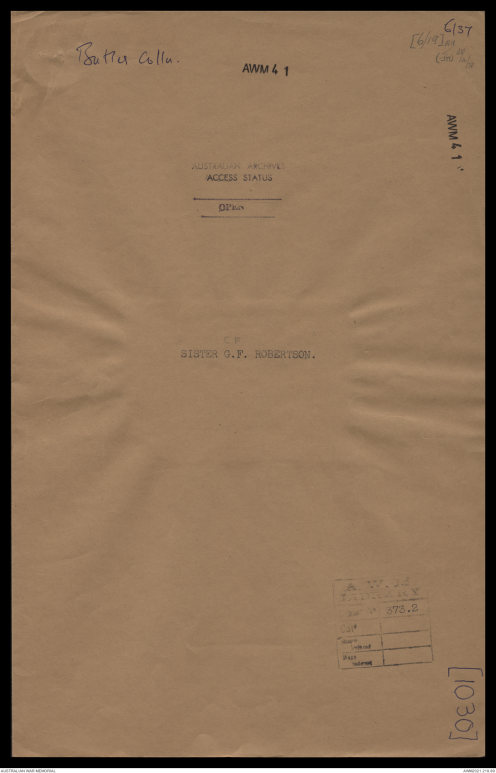
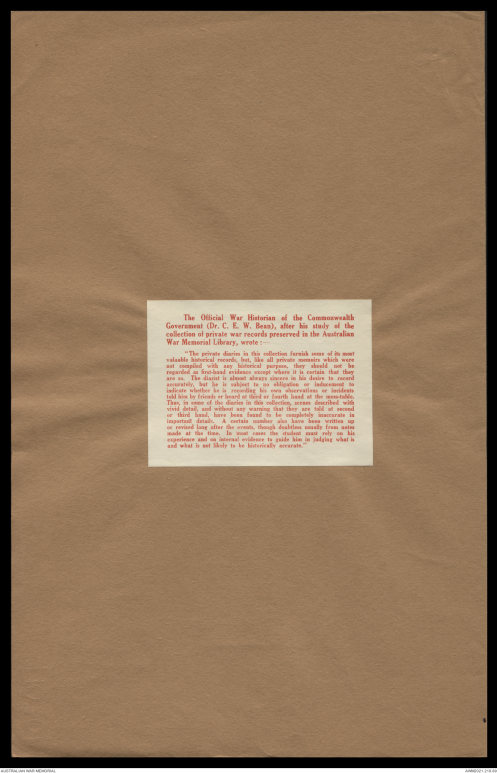
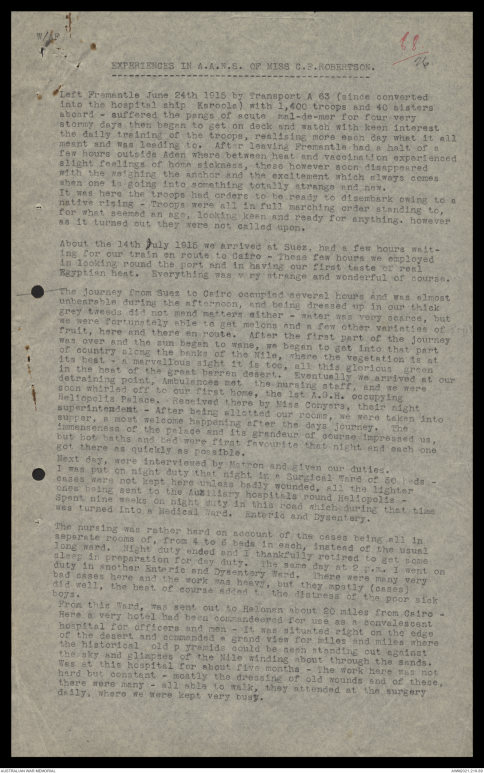
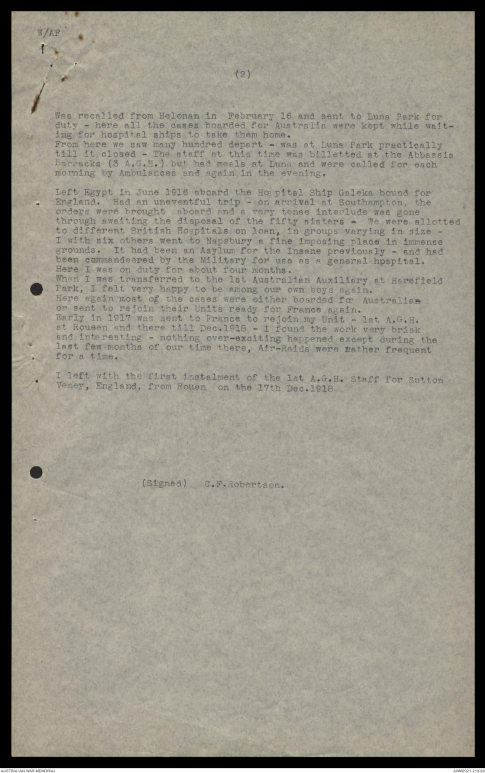
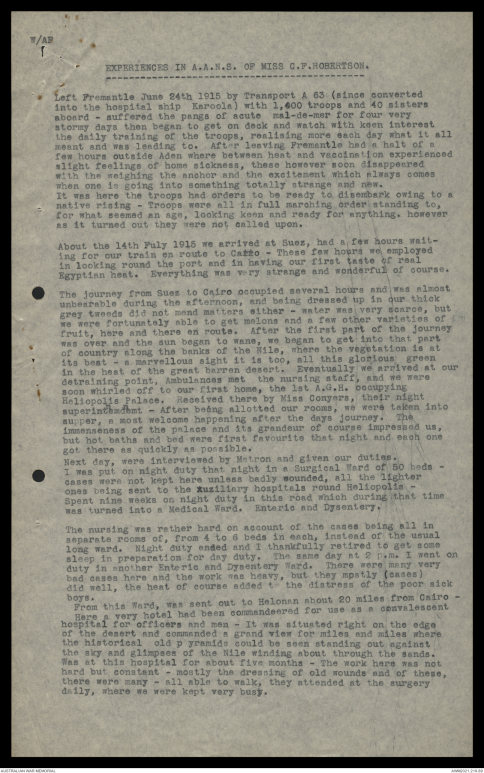
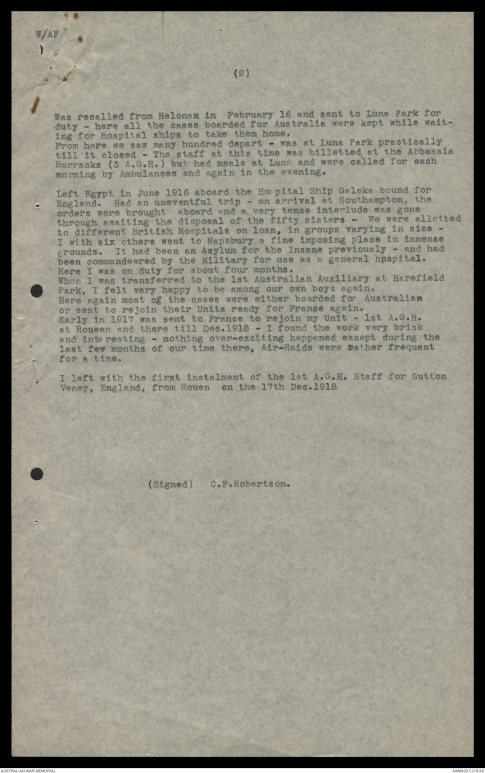
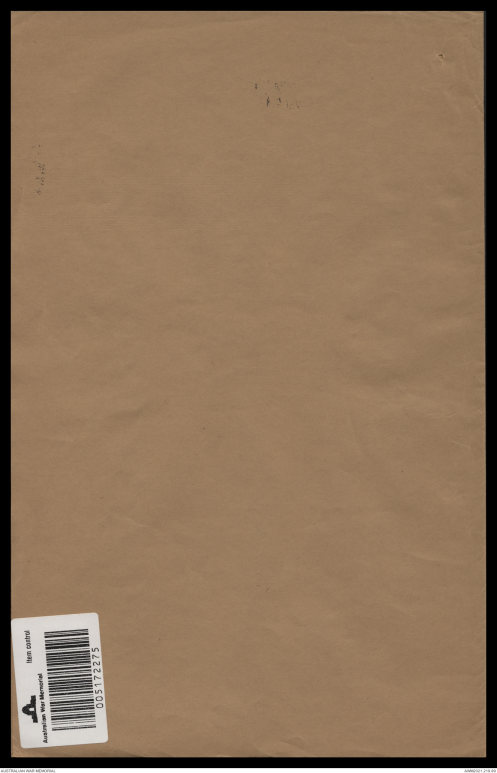
6/37
Butler Colin. [6/19]RH
AWM41
[*?*}
AUSTRALIAN ARCHIVES
ACCESS STATUS
OPEN
GF
SISTER G.F. ROBERTSON.
A.W.M.
LIBRARY
Cal No. 373.2
Cal
[1030]
The Official War Historian of the Commonwealth
Government (Dr. C. E. W. Bean), after his study of the
collection of private war records preserved in the Australian
War Memorial Library, wrote :—
"The private diaries in this collection furnish some of its most
valuable historical records, but like all private memoirs which were
not compiled with any historical purpose, they should not be
regarded as first-hand evidence except where it is certain that they
are so. The diarist is almost always sincere in his desire to record
accurately, but he is subject to no obligation or inducement to
indicate whether he is recording his own observation or incidents
told him by friends or heard at third or fourth hand heard at the mess-table.
Thus, in some of the diaries in this collection, scenes described with
vivid detail, and without any warning that they are told at second
or third hand have been found to be completely inaccurate in
important details. A certain number have been written up
or reviewed long after the events, though doubtless usually from notes
made at the time. In most cases the student must rely on his
experience and on internal evidence to guide him in judging what is
and what is not likely to be historically accurate."
W/AF 68./26
EXPERIENCES IN A.A.N.S OF MISS G.F.ROBERTSON.
Left Fremantle June 24th 1915 by Transport A 63 (since converted
into the hospital ship Karoola) with 1,400 troops and 40 sisters
aboard- suffered the pangs of acute mal-de-mer for four very
stormy days then began to get on deck and watch with keen interest
the daily training of the troops, realising more each day what it all
meant and was leading to. After leaving Fremantle had a halt of a
few hours outside Aden where between heat and vaccination experienced
slight feelings of home sickness, these however soon disappeared
with the weighing of the anchor and the excitement which always comes
when one is going into something totally strange and new.
It was here the troops had orders to be ready to disembark owing to a
native rising - Troops were all in full marching order standing to,
for what seemed like an age, looking keen and ready for anything, however
as it turned out they were not called upon.
About the 14th July 1915 we arrived at Suez, had a few hours waiting
for our train en route to Cairo - These few hours we employed
in looking around the port and in having our first taste of real
Egyptian heat. Everything was very strange and wonderful of course.
The journey from Suez to Cairo occupied several hours and was almost
unbearable during the afternoon, and being dressed in our thick
grey tweeds did not mend matters either - water was very scarce, but
we were fortunately able to get melons and a few other varieties of
fruit, here and there en route. After the first part of the journey
was over and the sun began to wane, we began to get into that part
of country along the banks of the Nile, where the vegetation is at
its best - a marvellous sight it is too, all this glorious green
in the heat of the great barren desert. Eventually we arrived at our
detraining point. Ambulances met the nursing staff, and we were
soon whirled off to our first home, the 1st A.G.H. occupying
Heliopolis Palace. Received there by Miss Conyers, their night
superintendent - After being allotted our rooms, we were taken into
supper, a most welcome happening after the days journey. The
immenseness of the palace and its grandeur of course impressed us,
but hot baths and bed were first favourite that night end each one
got there as quickly as possible.
Next day, were interviewed by Matron and given our duties.
I was put on night duty that night in a Surgical Ward of 50 beds -
cases were not kept here unless badly wounded, all the lighter
ones being sent to the Auxiliary hospitals round Heliopolis -
Spent nine weeks on night duty in this [road?] which during that time
was turned into a Medical Ward. Enteric and Dysentery.
The nursing was rather hard on account of the cases being all in
separate rooms of, from 4 to 6 beds in each, instead of the usual
long ward. Night duty ended and I thankfully retired to get some
sleep in preparation for day duty. The same day at 2 p.m. I went on
duty in another Enteric and Dysentery Ward. There were many very
bad cases here and the work was heavy, but they mostly (cases)
did well, the heat of course added to the distress of the poor sick
boys.
From this Ward, was sent out to Helonan about 20 miles from Cairo -
Here a very hotel had been commandeered for use as a convalescent
hospital for officers and men - It was situated right on the edge
of the desert and commanded a grand view for miles and miles where
the historical old p yramids could be seen standing out against
the sky and glimpses of the Nile winding about through the sands.
Was at this Hospital for about five months - The work here was not
hard but constant - mostly the dressing of old wounds and of these,
there were many - all able to walk, they attended at the surgery
daily, where we were kept very busy.
W/AF
(2)
Was recalled from Helonan in February 16 and sent to Luna Park for
duty - here all the cases boarded for Australia were kept while waiting
for hospital ships to take them home.
From here we saw many hundred depart - was at Luna Park practically
till it closed - The staff at this time was billetted at the Abbassia
Barracks (3 A.G.H.) but had meals at Luna and were called for each
morning by Ambulances and again in the evening.
Left Egypt in June 1916 aboard Hospital Ship Galeka bound for
England. Had an uneventful trip - on arrival in Southampton, the
orders were brought aboard and a very tense interlude was gone
through awaiting the disposal of the fifty sisters - We were allotted
to different British Hospitals on loan, in groups varying in size -
I with six others went to Napsbury a fine imposing place in immense
grounds. It had been an Asylum for the Insane previously - and had
been commandeered by the Military for use as a general hospital.
Here I was on duty for about four months.
When I was transferred to the 1st Australian Auxiliary at Harefield
Park, I felt very happy to be among our own boys again.
Here again most of the cases were either boarded for Australiax
or sent to rejoin their Units ready for France again.
Early in 1917 was sent to France to rejoin my Unit - 1st A.G.H.
at Rousen and there till Dec.1916 - I found work very brisk
and interesting - nothing over-exciting happened except during the
last few months of our time there, Air-Raids were rather frequent
for a time.
I left with the first instalment of the 1st A.G.H. Staff for Sutton
Veney, England, from Rouen on the 17th Dec.1918
(Signed) G.F.Robertson.
W/AF
EXPERIENCES IN A.A.N.S OF MISS G.F.ROBERTSON.
Left Fremantle June 24th 1915 by Transport A 63 (since converted
into the hospital ship Karoola) with 1,400 troops and 40 sisters
aboard- suffered the pangs of acute mal-de-mer for four very
stormy days then began to get on deck and watch with keen interest
the daily training of the troops, realising more each day what it all
meant and was leading to. After leaving Fremantle had a halt of a
few hours outside Aden where between heat and vaccination experienced
slight feelings of home sickness, these however soon disappeared
with the weighing of the anchor and the excitement which always comes
when one is going into something totally strange and new.
It was here the troops had orders to be ready to disembark owing to a
native rising - Troops were all in full marching order standing to,
for what seemed like an age, looking keen and ready for anything, however
as it turned out they were not called upon.
About the 14th July 1915 we arrived at Suez, had a few hours waiting
for our train en route to Cairo - These few hours we employed
in looking around the port and in having our first taste of real
Egyptian heat. Everything was very strange and wonderful of course.
The journey from Suez to Cairo occupied several hours and was almost
unbearable during the afternoon, and being dressed in our thick
grey tweeds did not mend matters either - water was very scarce, but
we were fortunately able to get melons and a few other varieties of
fruit, here and there en route. After the first part of the journey
was over and the sun began to wane, we began to get into that part
of country along the banks of the Nile, where the vegetation is at
its best - a marvellous sight it is too, all this glorious green
in the heat of the great barren desert. Eventually we arrived at our
detraining point. Ambulances met the nursing staff, and we were
soon whirled off to our first home, the 1st A.G.H. occupying
Heliopolis Palace. Received there by Miss Conyers, their night
superintendent - After being allotted our rooms, we were taken into
supper, a most welcome happening after the days journey. The
immenseness of the palace and its grandeur of course impressed us,
but hot baths and bed were first favourite that night end each one
got there as quickly as possible.
Next day, were interviewed by Matron and given our duties.
I was put on night duty that night in a Surgical Ward of 50 beds -
cases were not kept here unless badly wounded, all the lighter
ones being sent to the Auxiliary hospitals round Heliopolis -
Spent nine weeks on night duty in this [road?] which during that time
was turned into a Medical Ward. Enteric and Dysentery.
The nursing was rather hard on account of the cases being all in
separate rooms of, from 4 to 6 beds in each, instead of the usual
long ward. Night duty ended and I thankfully retired to get some
sleep in preparation for day duty. The same day at 2 p.m. I went on
duty in another Enteric and Dysentery Ward. There were many very
bad cases here and the work was heavy, but they mostly (cases)
did well, the heat of course added to the distress of the poor sick
boys.
From this Ward, was sent out to Helonan about 20 miles from Cairo -
Here a very hotel had been commandeered for use as a convalescent
hospital for officers and men - It was situated right on the edge
of the desert and commanded a grand view for miles and miles where
the historical old p yramids could be seen standing out against
the sky and glimpses of the Nile winding about through the sands.
Was at this Hospital for about five months - The work here was not
hard but constant - mostly the dressing of old wounds and of these,
there were many - all able to walk, they attended at the surgery
daily, where we were kept very busy.
W/AF
(2)
Was recalled from Helonan in February 16 and sent to Luna Park for
duty - here all the cases boarded for Australia were kept while waiting
for hospital ships to take them home.
From here we saw many hundred depart - was at Luna Park practically
till it closed - The staff at this time was billetted at the Abbassia
Barracks (3 A.G.H.) but had meals at Luna and were called for each
morning by Ambulances and again in the evening.
Left Egypt in June 1916 aboard Hospital Ship Galeka bound for
England. Had an uneventful trip - on arrival in Southampton, the
orders were brought aboard and a very tense interlude was gone
through awaiting the disposal of the fifty sisters - We were allotted
to different British Hospitals on loan, in groups varying in size -
I with six others went to Napsbury a fine imposing place in immense
grounds. It had been an Asylum for the Insane previously - and had
been commandeered by the Military for use as a general hospital.
Here I was on duty for about four months.
When I was transferred to the 1st Australian Auxiliary at Harefield
Park, I felt very happy to be among our own boys again.
Here again most of the cases were either boarded for Australiax
or sent to rejoin their Units ready for France again.
Early in 1917 was sent to France to rejoin my Unit - 1st A.G.H.
at Rousen and there till Dec.1916 - I found work very brisk
and interesting - nothing over-exciting happened except during the
last few months of our time there, Air-Raids were rather frequent
for a time.
I left with the first instalment of the 1st A.G.H. Staff for Sutton
Veney, England, from Rouen on the 17th Dec.1918
(Signed) G.F.Robertson.
 Sam scott
Sam scottThis transcription item is now locked to you for editing. To release the lock either Save your changes or Cancel.
This lock will be automatically released after 60 minutes of inactivity.